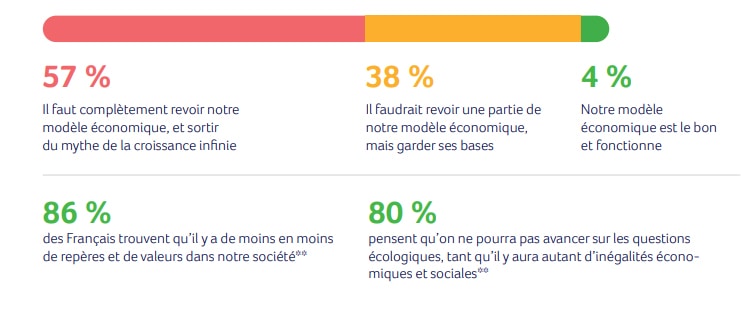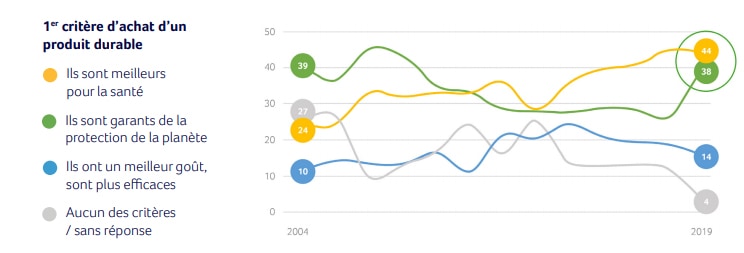Well, that's good news. The French seem to have understood that the taking and the attacks we are making on our environment are no longer sustainable. We must change our model, starting by changing our habits. A study conducted by Greenflex shows that the movement seems to have started. The French consume differently, in a more attentive and reasonable way. They no longer want to consume more and more as they have been used to over the last 30 years. What's more, it is not enough for them to consume better, they now want to consume less. This is a salutary realization.
An important survey on 6,000 French citizens and 10,000 Europeans was carried out by the YouGov polling institute for the Greenflex consulting firm, and supported by the French Environment and Energy Management Agency (Ademe). For Stéphane Petitjean, the firm's managing partner, 2019 marks a real breakthrough year. Until barely two years ago, responsible consumption rhymed for the French with consuming differently by selecting ethical organic or eco-labelled products. Two years ago, in 2017, only 14 %s declared they wanted to consume less. They have jumped to 15 % today: 27 % of the French people surveyed say they consume less, a sign of an awareness rooted in behaviour.

A figure unthinkable only ten years ago, 86 % of the French would like to live in a society where consumption would take up less space. Nine out of ten French people believe that this model is out of breath! Fifty-seven % say that we need to change completely, review our economic model and get away from the myth of infinite growth. Only 4 %s still think that our economic model is the right one and works.
- READ IN UP' : Growth at all costs: an untenable imperative?
Emergency for the planet
It must be said that the French are worried about the future of the planet. 60 %s of them believe that there is an urgent need to act and 13 %s think that it is already too late. In order, it is global warming, the collapse of biodiversity and the invasion of plastics that concern them the most. Worry and loss of meaning are on everyone's mind. The ecological challenge cannot be solved without taking into account the social and human dimensions. Eighty-six % feel the loss of reference points in our society and eight out of ten think that we will not move forward without resolving the inequalities of society.
Against a backdrop of ecological urgency and citizen mobilization, the observation of the excesses of a system that the French, like the Europeans, no longer want. This observation is a cold shower.
Why not enjoy unlimited reading of UP'? Subscribe from €1.90 per week.

However, the interviewees do not remain on a gloomy note. They want to take matters into their own hands, starting with their small or large habits. They are revolutionising their lifestyles. 67 % of them say they have changed some of their practices to reduce the impact of their consumption. Only 4 %s admit that they have no desire to change.
The virtue of small gestures
Among these "small gestures", three deserve to be highlighted: nine out of ten French people say they now only buy seasonal products. Goodbye strawberries and other tomatoes in winter; make way for a good cabbage and carrot soup when it's cold. Buying local is becoming a criterion of choice and not only in food. In fact, 68 % of the people interviewed said they prefer furniture made in France. Made in France is indeed on the upswing and is no longer just a political slogan. Finally, the various campaigns on animal abuse have borne fruit: 63 % of French people now take into account the issue of animal welfare when they consume.
Making sense
The French consume sustainably but not just anyhow. They don't let themselves be seduced by fashions. So they buy "bio", but they are careful to avoid the traps of bio. The green label is not enough. Eight out of ten French people consider that organic products are not all the same and that it is better to buy local and seasonal fruit and vegetables rather than products labelled organic but which come from another country. Consequently, more of them turn to alternative channels to supermarkets: 41 % prefer to go to small retailers, or even 36 % go directly to the producer.

But these virtuous consumption behaviours are not enough. The French, more than other European citizens, are more interested in "consuming less" and "differently". They are committed to ways other than consuming as before. Nearly 60 % of them say they recover, reuse, repair used products rather than throwing them away and buy new ones. For them, this is a way of getting involved, of wanting to make a difference. This desire to behave in a different way does not only concern the sphere of consumption. It also reaches the sphere of work, since 59 % of the respondents would like to have a meaningful job.

We sense the beginnings of a questioning that is also based on a mistrust of business. In 2004, there were 58 %s who trusted companies as actors of change; today, only 27 %s think so. This trend can be seen with varying degrees of nuance in the five other European countries studied in this survey (Germany, Spain, Italy, the United Kingdom and Sweden). In all countries, the consumption model is being strongly questioned and there is a shared desire to change lifestyles to reduce environmental impact. The French stand out from other Europeans through the implementation of concrete actions in their purchasing behaviour, moving away from traditional distribution actors to favour short and direct channels as much as possible.
Source: Greenflex-Ademe Barometer of Responsible Consumption - 2019
Header image: Visual of the collection quat-ruesfair trade in organic clothing
To fight against disinformation and to favour analyses that decipher the news, join the circle of UP' subscribers.













Small gestures such as: going to the supermarket with reusable bags, using public transportation, eating less meat, wearing the same clothes longer, spending your holidays where you live, reducing the air conditioning in summer, wearing a sweater indoors in winter, etc....
Small gestures such as: going to the supermarket with reusable bags, using public transportation, eating less meat, wearing the same clothes longer, spending your holidays where you live, reducing the air conditioning in summer, wearing a sweater indoors in winter, etc....